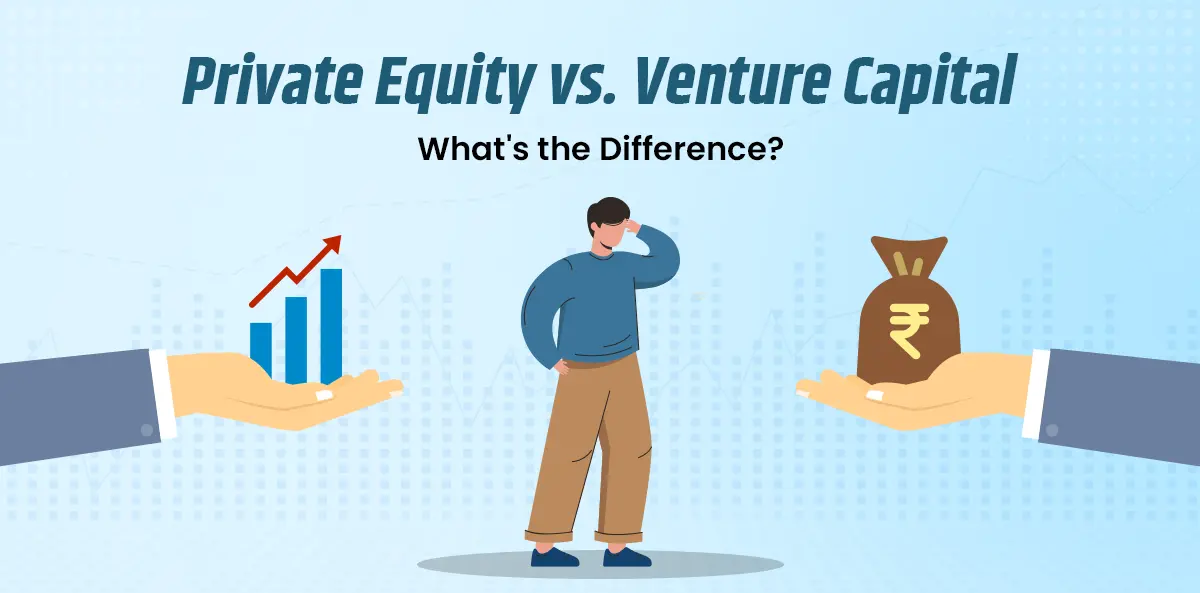Private Equity involves large investments in established companies. These investments are made by private equity funds, which are pools of capital collected from investors for investment purposes.
Venture Capital, on the other hand, involves smaller investments and is typically provided to startups or companies in the early stages of development. This type of funding supports new entrepreneurs who have high-risk ventures and need money to turn their ideas into reality.
This article will help you understand the difference between private equity and venture capital.
What is Venture Capital?
Venture capital is a type of private equity focused on providing financing to startups and emerging companies that are not yet profitable but have high growth potential.VC firms invest money in early-stage companies in exchange for an equity stake. If the company becomes very successful, the VC firm can earn many times its initial investment. However, because many promising companies fail, venture capital is considered a high-risk business.
For the target company, VC financing offers access to much-needed funds that can drive growth. In addition to funding, VC firms often provide expertise and guidance in areas like business development and strategy, which can be invaluable for entrepreneurs.VC firms can also help establish strategic partnerships among their portfolio companies, further aiding growth and development. This support can be crucial for startups aiming for rapid success.
If you’re looking to scale quickly, now is the time to connect with Navyug Global, a venture capital company in Chennai, India. Beyond just providing capital, we offer invaluable strategic advice and support, helping startups overcome early-stage challenges and achieve rapid growth. Don’t miss the opportunity to partner with Navyug Global and accelerate your business to new heights.
However, accepting VC funding involves some trade-offs. Entrepreneurs may lose some control over their company, as VC firms often want a say in major decisions. Additionally, accepting VC money means diluting ownership, as investors will expect their share of future profits.
What is Private Equity?
Private equity involves buying and managing companies that are not publicly traded on a stock exchange. The goal is to acquire underperforming or struggling companies and improve their performance to generate strong returns for investors.
Private equity firms use several strategies to achieve these results:
- Leveraged Buyouts (LBOs): In an LBO, a private equity firm takes on a significant amount of debt to purchase a company, often using the company’s assets as collateral. The debt is repaid over time using the company’s future cash flow. This strategy works well if the company has valuable assets and a strong potential for cash flow.
- Venture Capital (VC): This strategy involves making early-stage investments in promising companies that are not yet profitable and not publicly traded. These companies often have a strong business model and competent leadership, making them attractive to private equity firms.
- Growth Capital (GC): Similar to venture capital, growth capital is used for already profitable companies seeking further expansion. In growth capital investments, private equity firms usually take a minority interest rather than a controlling stake. These companies are more established than those seeking venture funding.
Private equity is a high-risk, high-reward investment strategy. Some companies may not turn around or generate the expected cash flow, leading to potential losses for the private equity firm. However, successful investments can result in substantial profits.
Difference Between Venture Capital and Private Equity
| Venture Capital (VC) | Private Equity (LBO) | |
|---|---|---|
| Lifecycle Stage | Early-Stage | Late-Stage |
| Investment Type | Minority Stake (<50%) | Majority Stake (>50%) |
| Return Drivers |
|
|
| Investors |
|
|
| Profitability | Pre-Revenue → Unprofitable | Stable, Consistent Profitability |
| Hold Period | 5 to 10 Years | 3 to 6 Years |
| Leverage | 0% | 50% to 75% |
Private Equity vs. Venture Capital: A Basic Overview
Both private equity and venture capital firms gather funds from outside investors, known as Limited Partners (LPs). These LPs include pension funds, endowments, insurance companies, and wealthy individuals.
These firms use the capital to invest in private companies or companies that become private, with the goal of selling these investments for a higher return in the future.
Both types of firms charge their LPs a management fee, usually between 1.5% and 2.0% of the assets they manage. This fee often decreases in later years.
They also earn a performance-based fee, known as “carried interest,” which is around 20% of the profits from their investments, provided they meet a minimum return, known as the “hurdle rate.”While these similarities exist, private equity and venture capital differ significantly in their approaches and strategies.While private equity (PE) and venture capital (VC) firms share some similarities, their approaches and focuses are quite distinct:
- Company Types:
- Private Equity: Invests in companies across various industries.
- Venture Capital: Primarily targets technology, biotech, and cleantech sectors.
- Percentage Acquired:
- Private Equity: Typically acquires a majority stake or the entire company.
- Venture Capital: Generally takes a minority stake in companies.
- Size of Deals:
- Private Equity: Engages in larger transactions, often involving more mature companies.
- Venture Capital: Deals are usually smaller and focused on newer, high-growth companies.
- Investment Structure:
- Private Equity: Uses a mix of equity and debt for investments.
- Venture Capital: Invests solely with the equity raised from outside investors.
- Investment Stage:
- Private Equity: Focuses on mature companies.
- Venture Capital: Invests in early-stage companies with high growth potential.
- Risk and Returns:
- Venture Capital: Anticipates higher failure rates but seeks significant returns from a few successful investments, like major tech successes.
- Private Equity: Avoids high-risk investments to protect the fund, focusing on stable returns.
- Value Creation:
- Venture Capital: Relies on the growth and increased valuations of companies.
- Private Equity: Utilizes growth, multiple expansions, and financial strategies to enhance returns.
- Operational Involvement:
- Private Equity: Often becomes more involved in company operations due to larger ownership stakes.
- Venture Capital: Generally less involved in day-to-day operations.
- Industry Professionals:
- Private Equity: Attracts former investment bankers.
- Venture Capital: Draws from a diverse range of backgrounds, including product managers, consultants, and entrepreneurs.
- Recruiting Process:
- Private Equity: Follows a structured, fast-paced recruitment process.
- Venture Capital: Uses a slower, more flexible recruiting approach.
- Work Environment:
- Private Equity: Resembles investment banking with long hours and intensive analysis.
- Venture Capital: More relaxed, with a focus on qualitative aspects and networking.
- Compensation:
- Private Equity: Typically offers higher salaries and bonuses due to larger fund sizes.
- Venture Capital: Generally has lower compensation compared to PE.
- Exit Opportunities:
- Venture Capital: Opens doors to other VC roles, startups, or operational positions.
- Private Equity: Often leads to continued work within PE or related deal-focused roles.
Top 10 Difference Between Private Equity vs. Venture Capital
#1: Company Types
Venture capital (VC) firms generally focus on technology and life sciences. However, they don’t limit their investments to these areas alone. Each year, a small portion of VC funding also goes into sectors such as media and entertainment, energy, and consumer products.
On the other hand, private equity (PE) firms invest across a broader range of industries. Yet, there are some areas PE firms typically steer clear of. For instance, few PE firms invest in commercial banks due to regulatory restrictions.
#2: Percentage Acquired and Deal Size
While it’s true that private equity (PE) firms typically acquire majority stakes or the entire company, and venture capital (VC) firms generally take minority stakes, the figures for deal sizes can be misleading.
#3: Structure, Stage, and Risk
Previously, private equity (PE) and venture capital (VC) had distinct approaches: PE used a mix of equity and debt, invested in mature companies, and avoided high risks, while VC relied solely on equity, targeted early-stage companies, and accepted higher risks with the hope of significant returns.
However, both types of firms have started engaging in growth-stage deals, which has blurred these traditional distinctions. This shift means that the lines between their risk profiles and potential returns have become more similar than different.
#4: Value Creation and Source of Returns
For venture capital (VC), the method of generating returns remains consistent: it relies on the growth of companies and the increase in their valuations over time.
In private equity (PE), the approach has evolved. Traditionally, PE firms used a significant amount of debt to acquire companies, relying heavily on “financial engineering” to drive returns. However, as many PE firms now use a higher equity contribution—typically 40-50%—the focus has shifted towards EBITDA (earnings before interest, taxes, depreciation, and amortization) growth to create value. This trend aligns PE more closely with growth-driven strategies similar to those used in VC.
#5: Operational Focus
While it’s often assumed that venture capital (VC) firms are less involved in their portfolio companies’ operations, some, like Andreessen Horowitz, have dedicated teams that help with recruiting, sales, and marketing.
Similarly, many private equity (PE) firms, particularly those focused on the middle market, concentrate on enhancing operational efficiency.
Due to the significant variation in how different firms engage with their portfolio companies, “operational focus” isn’t a strong differentiator between PE and VC. Each firm’s level of involvement can differ widely.
#6: People and HR Strategy
At the junior levels, mid-sized and large private equity (PE) firms often hire individuals with backgrounds in investment banking. In contrast, venture capital (VC) firms typically have a more diverse mix of professionals.
However, this distinction becomes less clear at higher levels. Many PE firms employ “Operating Partners” who bring significant executive experience in specific industries. Similarly, many senior venture capital team members come from backgrounds in banking or consulting. As a result, the profiles of people working in both PE and VC can overlap significantly at more advanced stages.
#7: The Recruiting Process
The recruiting processes for junior roles in private equity (PE) and venture capital (VC) can differ significantly:
- Private Equity: Large banks in the India often use an “on-cycle” process, which is fast-paced and highly structured. This approach is geared towards bankers looking to move to mid-sized or large PE firms. Outside the India and at smaller firms, the “off-cycle” process is more common, starting later and taking longer.
- Venture Capital: Recruiting in VC is usually “off-cycle,” with some of the largest firms taking weeks or even months to assess candidates.
#8: Work and Culture
In private equity (PE), the work involves more technical analysis and deal coordination, with an environment similar to investment banking. You’ll also spend considerable time monitoring portfolio companies, which some find less engaging.
In venture capital (VC), while the focus is less on technical work and more on qualitative aspects, the process of reviewing and rejecting deals is a significant part of the job as well.
The differences in work and culture between PE and VC might be somewhat overstated, as both fields involve extensive review of potential investments and often result in rejecting the majority of opportunities.
#9: Salary and Compensation
When comparing private equity (PE) and venture capital (VC), compensation is a key factor:
- Base Salaries: Generally, base salaries are higher in private equity across all levels compared to venture capital. This is often due to the larger fund sizes and greater financial resources in PE.
- Bonuses: PE firms typically offer larger bonuses. The size of the bonus can vary with the fund’s performance and the individual’s role.
- Carried Interest: Both PE and VC offer carried interest, which is a share of the profits from investments. However, the amount and potential earnings from carried interest are usually greater in PE due to larger fund sizes and higher deal values.
#10: Exit Opportunities
Life is not just about financial gain, so what are the options when you’re ready to move on from private equity (PE) or venture capital (VC)?
For Private Equity Professionals:
- Move to Hedge Funds: Hedge funds offer the possibility of achieving a good return on investment within a shorter time frame compared to PE.
- Transition to Venture Capital: Although the risk-reward balance in VC might not be as high as in PE, the opportunity to be involved with early-stage startups can be exciting.
- Join a Corporate Company: Many people from PE move into senior roles within their portfolio companies, such as C-suite positions or advisory roles like Head of Business Development.
For Venture Capitalists:
- Initial Public Offering (IPO): Selling your shares during an IPO can provide a return and allow you to exit.
- Mergers & Acquisitions (M&A): Combining with other companies or selling your stake through M&A can offer a return and help consolidate resources.
- Share Buyback: While not always possible, some larger companies may buy back shares as an exit route.
Private Equity vs. Venture Capital: Which Is Right for You?
Understanding the differences between private equity and venture capital is key to making the right choice. Your decision should be based on your company’s type, current stage, and your goals.
If you aim to generate substantial returns quickly, private equity might be your best bet. On the other hand, if you want to partner with knowledgeable investors and grow your business gradually, venture capital is a suitable option. Navyug Global Ventures Private Limited, a prominent venture capital company in Chennai, India, specializes in helping businesses achieve long-term success through strategic partnerships and investment.




